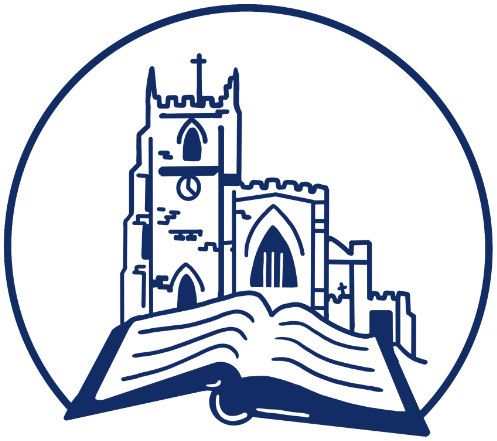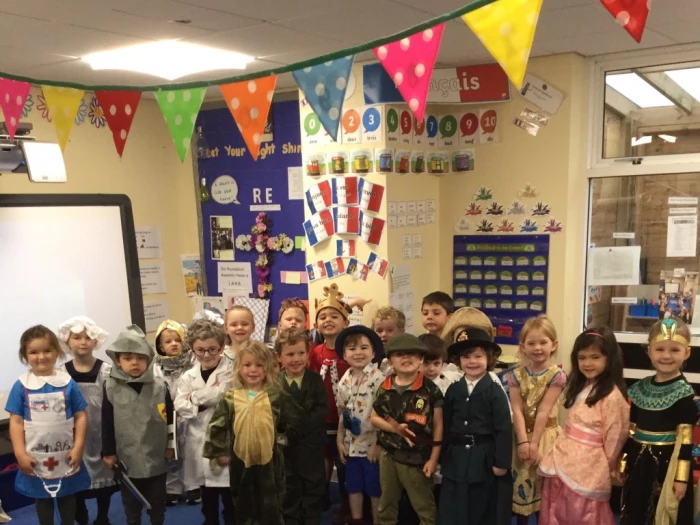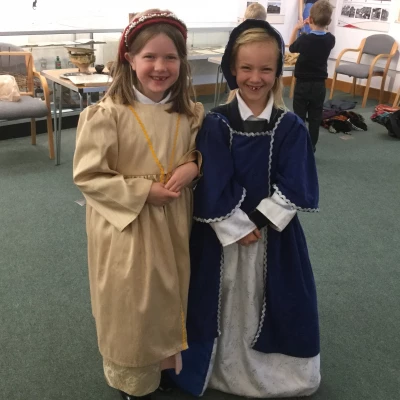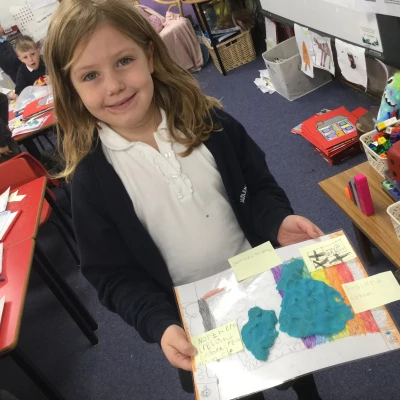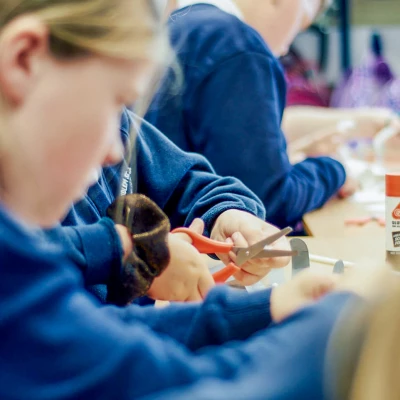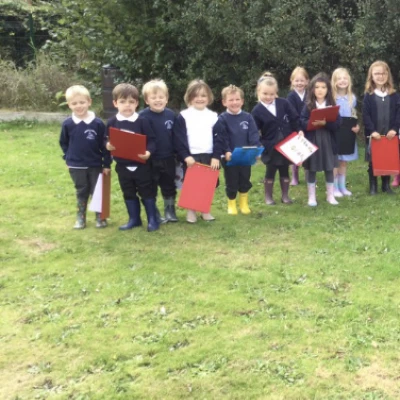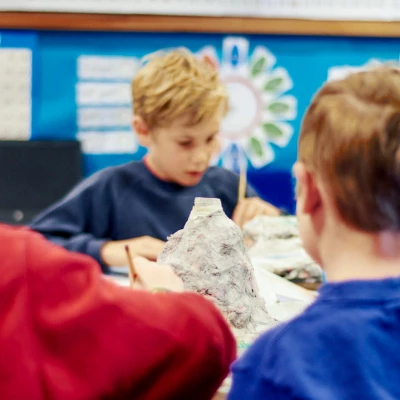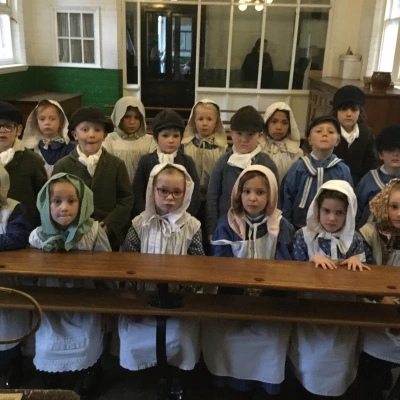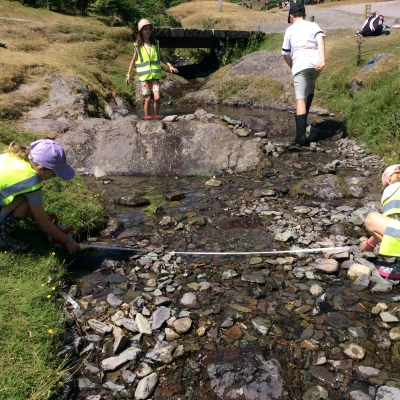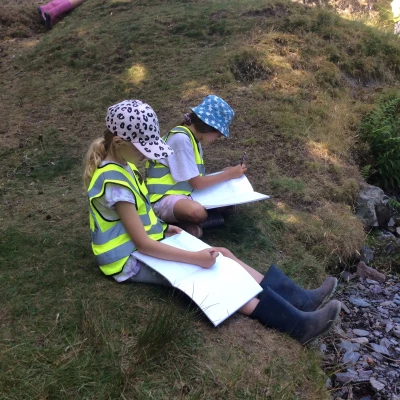Humanities
Our humanities curriculum is a framework which provides a broad balance of learning to include history, geography, RE and global citizenship. It has a local, national and international dimension. Topics are chosen to cover our locality so that children learn a sense of identity about who they are and where they live and its past story. We choose topics that ask bigger questions about how we might lead better lives; inflicting the least harm on each other and our planet.
Children are given opportunities to research and develop ideas through a variety of creative and practical activities. Visits to different locations allow children to explore first-hand, which deepens their understanding of the world in which they are growing up. Our humanities curriculum is both flexible and responsive to the children's individual needs and interests.
History
At Audlem Primary, we view history as a great deal more than learning facts. We see it as an opportunity to develop the skills of enquiry and questioning.
Intent
Our aim is to develop historical skills and concepts, which are transferable to whatever period of history is being studied and will equip children for future learning. It is our intention to develop a love of history and see how it has shaped the world we live in. The past comes to life when children use a variety of sources of information to find clues and evidence and take part in discussions with their peers. Through history, children learn metacognitively by learning to make comparisons and look for connections between different periods in the past and modern times, as well as discovering how and why things have changed. They learn about people and events in the past, in Britain and the wider world, and realise that these have influenced our lives today. Children are taught how to investigate and record their findings in interesting and creative ways including writing, art, drama and ICT.
Implementation
In order for children to know more and remember more in each area of history studied, there is a structure to the lesson sequence whereby prior learning is always activated and considered, and opportunities for revision of facts and historical understanding are built into lessons (particularly through our five Key Concepts: Invasion, Power/Monarchy, Religion, Communicationand Innovation).
We aim to engage our children in the historical process with practical activities such as fieldwork during Forest School. The Stone Age (Y3) has been brought to life with activities, which include cave art, food tasting, artefact handling and archaeological techniques. Working outdoors has deepened the understanding of history through engaging Forest School experiences. Lighting fires, sitting around them, and using them for cooking, is at the heart of Forest School practice. Having the opportunity to do these activities while discussing ancient people, and watching a demonstration of the history of fire making, develops respect for the survival skills of our prehistoric ancestors. Treasure hunts, for trees and plants, as well as foraging for food, shows the ingenuity and knowledge of ancient people and engenders respect for ancient culture. Best of all, from the pupils' point of view, is the making of dens – Neolithic shelters or Viking long ships. Throughout the sessions historical vocabulary is introduced in context, while the use of modern materials e.g. tarps instead of skins to make the shelters are explained.
We also celebrate significant people from the past through our annual 'Historical Heroes Day' where children dress up as somebody they admire from the past. Where appropriate, we encourage the use of heroes from diverse backgrounds.
Impact
The impact of using the full range of resources, including display materials, will be seen across the school with an increase in the profile of history. The learning environment across the school will be more consistent with historical technical vocabulary displayed, spoken and used by all learners. We want to ensure that history is loved by teachers and pupils across school, therefore encouraging them to want to continue building on this wealth of historical knowledge and understanding, now and in the future. At the end of each topic, teachers will have a reflection on standards achieved against the planned outcomes. If children are keeping up with the curriculum, they are deemed to be making good or better progress. This judgement will be made through a range of activities including deeper questions and teacher observations.
Geography
Our Geography curriculum is designed to develop children's curiosity and fascination about the world that we live in. Children investigate the seven continents and five oceans to help develop their knowledge and understanding of the Earth's physical and human processes. We are committed to providing children with opportunities to investigate and make enquiries about their local area of Nantwich so that they can develop of real sense of who they are, their heritage and what makes our local area unique and special.
We aim to develop the children's ability to apply geographical skills in order for them to confidently communicate their findings and geographical understanding to a range of audiences.
Intent
Through high quality teaching of key skills and concepts, we develop the following essential characteristics of geographers:
An excellent locationalknowledge of where places are; their important physical and human features; and their respective climatesand economies, both in the United Kingdom and the wider world.
An extensive base of geographical knowledge and vocabulary.
Fluency in complex, geographical enquiry and the ability to apply questioning skills, as well as effective presentation techniques.
The ability to reach clear conclusions and explain their findings.
Excellent fieldwork skills as well as other geographical aptitudes and techniques which include the ability to read maps, atlases and globes.
The ability to express well-balanced opinions, rooted in very good knowledge and understanding about current issues in society and the environment.
A genuine interest in the subject and a real sense of curiosity about the world and the people who live here.
Implementation
In ensuring high standards of teaching and learning in geography, we implement a curriculum that is progressive throughout the whole school. Geography is taught in at least 2 of the 3 school terms and can link to individual class topics. Each class focuses on knowledge and skills which link to the National Curriculum.
At Audlem, we ensure that geography has a huge importance given to it through workshops and curriculum focus weeks, as we feel this is important in enabling all children to gain 'real-life' experiences. As a school, we have OS Maps of the local area which allow children to compare the similarities and differences in landscapes and communities locally. Classes are encouraged to use maps, atlases and globes (both physical and online) as resources as regularly as possible to provide real-life skills.
Impact
Children will leave Audlem secure in key geographical skills such as map reading, enquiry based investigations and locational knowledge.
Children will respect the world we live in and understand the need to protect it – encouraging children to become courageous advocates for the environment and its peoples.
We want the children to have thoroughly enjoyed learning about geography, therefore encouraging them to undertake new life experiences now and in the future.
Pupils confidently talk about geography and positively discuss their learning experiences in the subject.
Children from Audlem recognise the importance of their local area and appreciate the benefits of living in this locality.
Our Partners

